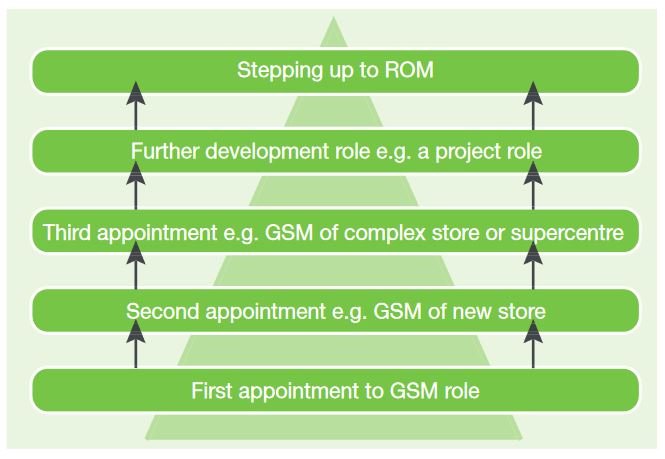
ASDA’s mission is ‘to be Britain’s best value retailer exceeding customer needs, every day’. This is backed by its purpose – ‘to save everyone money, every day’. ASDA recognises that these depend on a commitment always to put customers first in everything ASDA does, which is achieved through dedicated teams of ASDA colleagues.
ASDA is a private limited company, with its Home Office (Head Office) in Leeds. ASDA shares a common culture with its parent company, the US retailer Walmart and puts value for money at the heart of its operations. ASDA’s beliefs (also known as values) are lived and communicated to all colleagues and reflected in everything the business does.

ASDA is always at the heart of the community, often with many generations of a family working at the same store. ASDA also supports a strong corporate social responsibility (CSR) ethos. This is shown through its employment and career opportunities in communities, its support for customers through low prices, as well as charity activities and health initiatives.
ASDA is recognised nationally for its low prices and warm and friendly service. The business has over 500 stores across the UK and Northern Ireland, including large Supercentres and Superstores as well as smaller supermarkets found in towns and suburbs. ASDA has seen significant expansion over the last few years. As well as offering food and general merchandise, ASDA has diversified into optical and pharmaceutical services, as well as mobile phone and financial services, with more categories launched each year.
There are 25 ASDA Living stores for non-food merchandise, two Home Shopping stores supporting the online shopping service and 27 Distribution centres. The George brand overtook Marks and Spencer in 2009 to become the UK’s leading fashion retailer by volume. ASDA’s customer base has increased through its online services, www.asda.com and ASDA Direct. ASDA’s training and development programmes help its colleagues and managers to grow to meet these challenges.
Equal opportunities
ASDA is an equal opportunities employer. It supports young people with careers in retail, for example, its ‘Flying the Flag’ programme offers work experience at ASDA for young people for one or two weeks each year.
Each store ‘adopts’ two local secondary schools to encourage young people to consider a career in retail. Each store has a Community Colleague that works in the local community. He or she regularly visits schools to talk about the retail sector and their own experiences of working at ASDA, as well as the varied and numerous career options available. The company provides development opportunities to enable ASDA colleagues to reach their potential, whether as a manager in the store or taking a place in the boardroom, regardless of their starting point.
ASDA employs over 170,000 colleagues and rewards long service. It focuses on developing an accessible ‘family’ atmosphere in the stores. This provides a platform for long-term careers as colleagues develop within the business. Around 80% of ASDA managers began their careers in its stores.
Training and development
Training involves acquiring new skills and knowledge in relation to a current role. Development relates to a person’s potential to acquire wider capabilities. ASDA uses both to support its mission and to benefit the business and colleagues. The retail sector offers a long-term career path. By developing colleagues with the potential to be GSMs, ASDA has put in place a robust long-term succession plan to develop the ROMs of the future.
GSMs are like managing directors – may have responsibility for 500+ colleagues and a sales turnover of over £1 million a week. They need to be able to demonstrate a wide range of behaviours and technical skills. They are responsible for:
- leadership – leading their store teams
- celebrating achievement and managing under-performance, supporting improvement where needed
- coaching and developing colleagues and managers
- setting goals and agreeing on priorities by responding to change and spotting opportunities
- being a role model for the ASDA Way of Working – an approach whereby all colleagues are engaged and involved in improving the business – through inspiring and coaching others.
ASDA uses both on-the-job and off-the-job training to develop colleagues at all levels. As GSM begins their transition to a ROM role, they need to complete several different types of activities.
On-the-job training
On the job, GSMs begin to experience the ROM role in order to put their skills into practice. On-the-job activities account for 80% of their development and it is up to the individual to drive their own development opportunities. Examples include:
- covering their ROM’s duties when they are on holiday
- receiving guidance from a mentor on the Retail Board (a senior manager)
- attending meetings on behalf of the ROM
- owning regional projects.
Off-the-job training

Off-the-job, GSMs develop the skills needed to be a ROM through modules and a series of external coaching. These account for around 20% of the overall development:
- ‘Being at my Best’ – this programme focuses on emotional intelligence and supports GSMs to understand their strengths and areas for development.
- ‘Multi-site coaching’ – improves an individual’s capability to coach across the range of GSMs using different coaching conversations and styles.
- ‘Influencing across the business’ – provides an opportunity to learn how to communicate in a compelling way.
- ‘Thought Leadership’ – develops the capability to lead a team through innovation, creative thinking and leading with courage.
- GSMs also receive telephone coaching to support them and address development needs.
Costs and benefits of training and development
Even in tough economic times, ASDA takes the long-term view that investment in training and development is the right thing to do both for the business and its people.
ASDA has dedicated Stores of Learning (SOLs) across the company. These are stores which serve as centres of excellence for technical and behavioural training. Appropriate investment in training and development increases retention of colleagues and leads to higher performing and productive teams, which in turn support ASDA’s growth and expansion plans.
The key benefits of ASDA’s training are seen in:
- increased colleague productivity – where customers are served and satisfied more quickly. This improves colleague efficiency, reduces costs and leads to higher profitability.
- the quality of ASDA’s well trained colleagues. A pleasurable shopping experience means customers are more likely to return to the store to shop. This gives ASDA a competitive advantage.
- high morale which leads to a more motivated team. If colleagues are motivated to develop there are many opportunities open to them. The resulting sense of achievement that colleagues convey in their work contributes to a positive corporate image.
- ASDA aims to fill 80% of appointments through internal promotion.
Wendy is an ASDA colleague who developed from a GSM to a ROM role. This is her view of what working at ASDA is like.
‘It’s dynamic, fast-paced and challenging. I’m given all the space I need to do things my way, which I find really inspiring. Of course, we have a framework that we all work to, but it is very flexible, so I never feel constrained at all. In fact, this is one of the reasons I joined ASDA in the first place. My first role was as GSM for a failing store in Kent. I devised a three-month plan – ‘Project Phoenix’ – to turn the whole store around. When I started, we achieved a score of just 56% at our audit; three months later and we were at 95% – a brilliant example of success when everyone pulls together. I am now a Regional Operations Manager for Kent. At ASDA, if you put in the work, the reward and progression is definitely available’.
Progression routes

There are many different roles within ASDA, from shop floor colleagues and specialist roles like bakery to fashion buyers and lawyers. The career path shown is for a GSM who wants to develop into a ROM. Working in several different stores provides GSMs with the experience and background to operate effectively in a ROM role.
Mark, a GSM who has recently opened a new ASDA store in Cumbria, says: ‘I joined ASDA as a shop floor colleague in 1990. I knew nothing about retail but my Careers Advisor suggested I apply to ASDA as it looked an exciting place to work. I believe that the development programmes here have been a key part of my career progression. I have been a Grocery colleague, a Night Manager, a Training Manager and a Project Manager at our Home Office in Leeds. I became a GSM about three years ago. Since then I have developed personally and professionally through working as a store manager in three different stores.
Prior to becoming a GSM, all managers will usually work as an Ambient Trading Manager or Fresh Trading Manager. These roles are responsible for the whole range of food trading, home shopping and warehousing within a store. This on-the-job experience gives colleagues a better insight into the complexities of the business.
They become aware of all aspects of the store, not just the management issues. For example, the warehousing experience is very important in order to learn first-hand the practicalities of effective stock control. This enables prospective GSMs to understand the implications of efficiently managing costs and minimising wastage.
Kieran, Retail Graduate of ROM

Another ASDA colleague, Kieran, started as a Retail Graduate with ASDA and has now progressed to a ROM role. He says: ‘I was working at ASDA whilst studying for a degree in Law so I applied to the ASDA graduate scheme. After my initial training, I started as a Home & Leisure Manager. I then moved around to different roles before becoming a Senior Manager. A year later I moved into ASDA House (Home Office) to work as Project Manager to the Chief Executive. A year after moving back into retail and running my own store, I became Regional Availability Manager. ASDA lets managers take risks on people and gives them a chance – with the right support you can go very far, very fast. Retail is open to all, and if you have the right attitude, work hard and deliver, you will get on. How quickly or how far is up to you.
ASDA offers a personalised approach to developing skills and leadership behaviours. Colleagues have the chance to experience different business environments, perhaps in a Supercentre, Distribution Centre or in a role in Home Office (Head Office).
At all levels, including moving from a GSM to a ROM role, development must be driven by the colleague and relies on individual activity and personal motivation. ASDA colleagues must take responsibility for their personal development.
Identifying training and development needs
Identifying skills and development opportunities for senior roles is essential to maintain leadership succession.
ASDA’s aim is ‘to ensure we identify and create a robust internal succession plan to develop our internal talent’. It, therefore, provides a visible and structured career path for its GSMs, backed up by technical and behavioural training.

Asda runs Development Days with its senior managers to identify where their development opportunities are. These consist of many different activities such as business simulations, presentations and in depth interviews. ASDA also uses psychometric tests, 360-degree Leadership Surveys, 1-1 diagnosis with line managers and annual appraisals to help identify development needs. It is essential that each person’s development plan is ‘fit for purpose’ and tailored to individual requirements.
These tools help ensure that the investment ASDA makes in training and development helps the business achieve its objectives. All training and development should contribute to improving ASDA’s overall business performance. The GSM-ROM programme is designed to provide a structured yet flexible approach to developing a career path. The programme fits around a GSM’s own personal experiences and current technical and behavioural skills. This aligns his or her career development path to meet and overcome the challenges of their store.
A GSM’s performance is measured equally on both outcomes (the ‘what’) and behaviours (the ‘how’). One of the ways these are assessed is through feedback from other colleagues. This process focuses on Likes, Concerns and Suggestions (LCS) and ensures that feedback is always constructive.
Once training needs are identified these are managed through various programmes, such as store visits, Line Manager coaching, off-the-job modules, coaching calls and mentoring.
Conclusion
ASDA’s tailored and personalised approach to training and development provides a strong foundation to meet its current and future leadership needs.
The company plays to individuals’ strengths and offers various channels through which they can develop. This produces ASDA colleagues who are committed to the success and expansion of the business.
By promoting and supporting progression at all levels, ASDA enables its colleagues to focus on ‘being at their best’ and growing within the company. The results are increased morale, quality of work, higher productivity, and in the long-term, increased colleague retention and profitability. In this way, everyone in the company delivers the highest standards of service to meet ASDA’s objectives and help the business to reach its goals.
